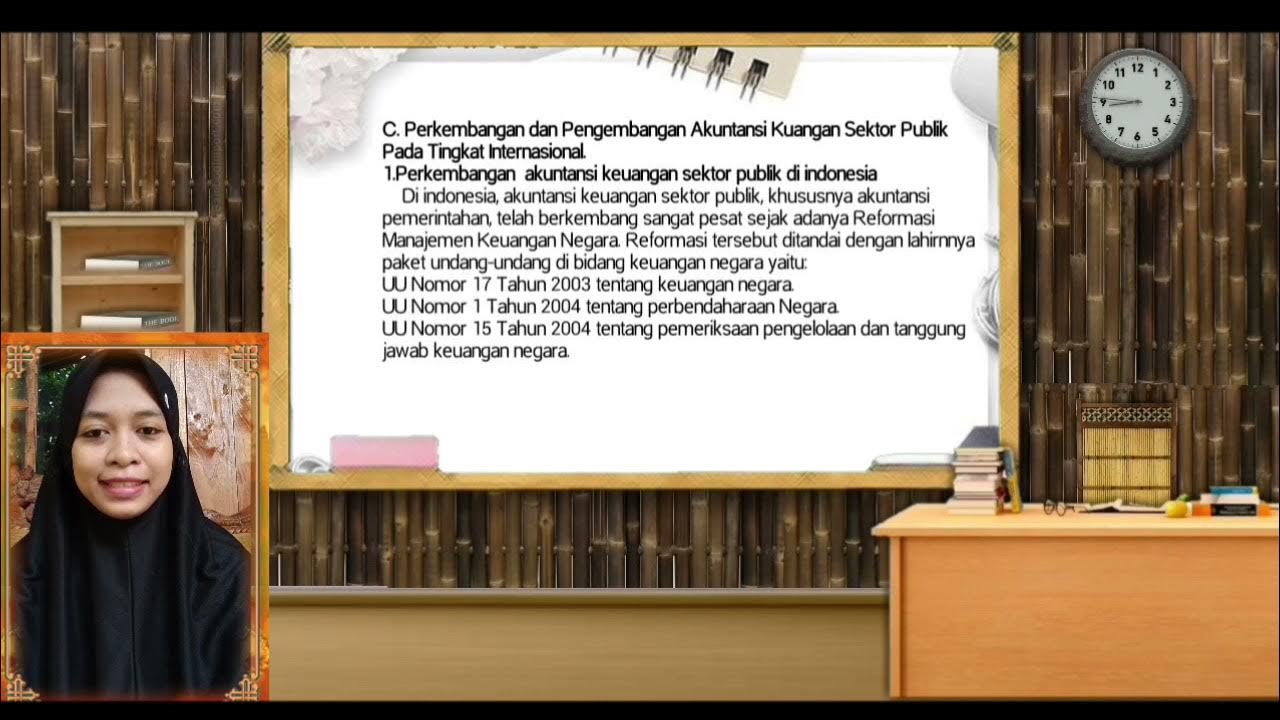Penentuan Harga Pelayanan Sektor Publik | Akuntansi Sektor Publik | Pontianak
Summary
TLDRIn this video, the speaker delves into the topic of public sector accounting, focusing on the determination of service pricing by the government. It explains the reasons behind charging fees for certain services, such as healthcare and education, while maintaining that essential public services like identity document processing should remain free. The discussion touches on concepts like public vs. private goods, economic efficiency, and resource scarcity. The speaker also highlights how service charges can help the government generate revenue and ensure the sustainability of public services. The aim is to balance public welfare and financial responsibility.
Takeaways
- 😀 Public services are the responsibility of the government, and some services can be subject to charges or tariffs based on their nature.
- 😀 Government services are funded by two primary sources: taxes and direct charges. Taxes are general, while direct charges are specifically tied to the services provided.
- 😀 Certain services, such as healthcare and education, may be subject to tariffs when they approach private sector involvement (e.g., private hospitals and schools).
- 😀 Public services like identity card (KTP) processing or birth certificates should not have tariffs because they are considered pure public goods.
- 😀 Tariff imposition is justified when the service has elements of private goods or when efficiency in public spending is needed.
- 😀 Goods are categorized into private, public, and mixed (between private and public), influencing whether a tariff is applied. Private goods can be traded, while public goods should remain untaxed.
- 😀 Efficiency in government spending is a key reason for imposing tariffs to avoid overspending and maintain fiscal health.
- 😀 The principle of profit generation is another reason for tariffs; when a government agency or entity earns revenue, it contributes to public funds for other government activities.
- 😀 Scarcity of resources is a core reason behind charging tariffs for certain services, ensuring that resources are used efficiently and not wasted.
- 😀 The imposition of tariffs, such as on fuel or other resources, helps regulate consumption and ensures sustainability in resource use, preventing shortages.
- 😀 Tariffs are also implemented to manage varying needs, such as whether a service is for personal use or business, with businesses typically more likely to be charged for services they use.
Q & A
What is the main topic of the video script?
-The main topic of the video script is about determining the pricing and tariffs for public services, particularly in the context of public sector accounting.
What are the two sources of funding for public services mentioned in the script?
-The two sources of funding for public services mentioned in the script are taxes and direct charges (or tariffs) for the services provided by the government.
Why is the government allowed to charge tariffs for some public services?
-The government is allowed to charge tariffs for services that are approaching privatization, such as healthcare and education, where private institutions also provide similar services.
Can the government charge fees for purely public services like identity documents? Why or why not?
-No, the government cannot charge fees for purely public services like identity documents (e.g., KTP, birth certificates) because these services are considered public goods, which should not be commercialized.
What are the key reasons for the government to charge fees for public services?
-The key reasons for charging fees include managing the distinction between private and public goods, ensuring economic efficiency, and adhering to profit principles for public enterprises.
What is the difference between private and public goods as explained in the script?
-Private goods are goods and services that can be sold and traded (e.g., food, electricity), while public goods are meant for the public welfare and should not be commercialized or sold (e.g., identity management).
How does charging for public services contribute to economic efficiency?
-Charging for public services helps manage government spending, ensuring that resources are used efficiently and not overspent, which also prevents waste and financial inefficiencies.
What role does the principle of scarcity play in the justification for charging fees for public services?
-The principle of scarcity ensures that resources, such as fuel, are used economically and not wasted. Charging fees helps regulate the consumption of scarce resources by making them less accessible when they are in short supply.
What examples of private goods were mentioned in the script, and why can they be sold?
-Examples of private goods mentioned in the script include food, electricity, and telecommunication services (e.g., phone services). These can be sold because they are provided by private companies, and their consumption is regulated by market prices.
Why are public services like healthcare and education allowed to charge fees, despite being traditionally public goods?
-Public services like healthcare and education can charge fees because they are increasingly privatized, and private institutions also provide these services. The fees are not meant to generate profit but to maintain economic efficiency.
Outlines

هذا القسم متوفر فقط للمشتركين. يرجى الترقية للوصول إلى هذه الميزة.
قم بالترقية الآنMindmap

هذا القسم متوفر فقط للمشتركين. يرجى الترقية للوصول إلى هذه الميزة.
قم بالترقية الآنKeywords

هذا القسم متوفر فقط للمشتركين. يرجى الترقية للوصول إلى هذه الميزة.
قم بالترقية الآنHighlights

هذا القسم متوفر فقط للمشتركين. يرجى الترقية للوصول إلى هذه الميزة.
قم بالترقية الآنTranscripts

هذا القسم متوفر فقط للمشتركين. يرجى الترقية للوصول إلى هذه الميزة.
قم بالترقية الآنتصفح المزيد من مقاطع الفيديو ذات الصلة

[MEET 10-1] AKUNTANSI SEKTOR PUBLIK - AKUNTANSI ASET & KEWAJIBAN

CONTABILIDADE PÚBLICA PARA CONCURSOS - AULA 02 - PARTE 02/03 - NOÇÕES DE PCASP

REGULASI : STANDAR AKUNTANSI PEMERINTAH

Akuntansi Sektor Publik (Karakteristik dan Ruang Lingkup)

Urgensi Pengembangan Akuntansi Keuangan Sektor Publik*

Materi Akuntasi Pemerintah Daerah Kelas 11 Praktikum Akuntansi Lembaga
5.0 / 5 (0 votes)
